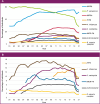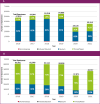Practical Guidance for Clinical Microbiology Laboratories: Updated guidance for processing respiratory tract samples from people with cystic fibrosis
- PMID: 39158301
- PMCID: PMC11391703
- DOI: 10.1128/cmr.00215-21
Practical Guidance for Clinical Microbiology Laboratories: Updated guidance for processing respiratory tract samples from people with cystic fibrosis
Abstract
SUMMARYThis guidance presents recommendations for clinical microbiology laboratories for processing respiratory samples from people with cystic fibrosis (pwCF). Appropriate processing of respiratory samples is crucial to detect bacterial and fungal pathogens, guide treatment, monitor the epidemiology of cystic fibrosis (CF) pathogens, and assess therapeutic interventions. Thanks to CF transmembrane conductance regulator modulator therapy, the health of pwCF has improved, but as a result, fewer pwCF spontaneously expectorate sputum. Thus, the collection of sputum samples has decreased, while the collection of other types of respiratory samples such as oropharyngeal and bronchoalveolar lavage samples has increased. To optimize the detection of microorganisms, including Pseudomonas aeruginosa, Staphylococcus aureus, Haemophilus influenzae, and Burkholderia cepacia complex; other less common non-lactose fermenting Gram-negative bacilli, e.g., Stenotrophomonas maltophilia, Inquilinus, Achromobacter, Ralstonia, and Pandoraea species; and yeasts and filamentous fungi, non-selective and selective culture media are recommended for all types of respiratory samples, including samples obtained from pwCF after lung transplantation. There are no consensus recommendations for laboratory practices to detect, characterize, and report small colony variants (SCVs) of S. aureus, although studies are ongoing to address the potential clinical impact of SCVs. Accurate identification of less common Gram-negative bacilli, e.g., S. maltophilia, Inquilinus, Achromobacter, Ralstonia, and Pandoraea species, as well as yeasts and filamentous fungi, is recommended to understand their epidemiology and clinical importance in pwCF. However, conventional biochemical tests and automated platforms may not accurately identify CF pathogens. MALDI-TOF MS provides excellent genus-level identification, but databases may lack representation of CF pathogens to the species-level. Thus, DNA sequence analysis should be routinely available to laboratories for selected clinical circumstances. Antimicrobial susceptibility testing (AST) is not recommended for every routine surveillance culture obtained from pwCF, although selective AST may be helpful, e.g., for unusual pathogens or exacerbations unresponsive to initial therapy. While this guidance reflects current care paradigms for pwCF, recommendations will continue to evolve as CF research expands the evidence base for laboratory practices.
Keywords: MALDI-TOF MS; cystic fibrosis; pathogen identification; respiratory pathogens; small colony variants; susceptibility testing.
Conflict of interest statement
Lisa Saiman receives grant funding (provided to institution) from the U.S. CF Foundation and serves as a consultant to the CF Foundation. Valerie Waters receives grant funding from the U.S. CF Foundation and CF Canada. John J. LiPuma receives grant funding from the U.S. CF Foundation. Lucas R. Hoffman receives grant funding from the U.S. CF Foundation. Kevin Alby has no conflicts of interest to report. Sean X. Zhang receives grant funding from the U.S. CF Foundation. Yvonne C. Yau receives grant funding from the U.S. CF Foundation and CF Canada. Damian G. Downey receives grants from the CF Trust and U.S. CF Foundation. He receives support from the European CF Society and U.S. CF Foundation for travel to meetings. He is the Director of the European CF Society Clinical Trials Network. Isabelle Sermet-Gaudelus receives funding from the European Cystic Fibrosis Society and the UK Cystic Fibrosis Trust. Jean-Philippe Bouchara receives funding from Vaincre la Mucoviscidose, La Pierre Le Bigaut, Association Grégory Lemarchal, and Anjou Muco. Timothy J Kidd has no conflicts of interest to report. Scott C. Bell receives grant funding from the U.S. CF Foundation, the Australian National Health and Medical Research Council, and the Medical Research Future's Fund. A. Whitney Brown is an employee of the U.S. CF Foundation.
Figures




References
-
- Ruseckaite R, Salimi F, Earnest A, Bell SC, Douglas T, Frayman K, Keatley L, King S, Kotsimbos T, Middleton PG, Morey S, Mulrennan S, Schultz A, Wainwright C, Ward N, Wark P, Ahern S. 2022. Survival of people with cystic fibrosis in Australia. Sci Rep 12:19748. doi: 10.1038/s41598-022-24374-4 - DOI - PMC - PubMed
Publication types
MeSH terms
LinkOut - more resources
Full Text Sources
Medical

